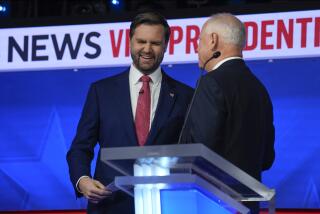The Obama-McCain veepstakes
- Share via
Today’s question: Name your VP for both parties. Click here to read previous installments from this week’s Dust-Up.
Obama’s and McCain’s picks should amplify their messages
Point: Ezra Klein
The veepstakes, huh? I guess it was unavoidable. I’ll say, as a starting point, that vice presidential picks probably don’t matter. There’s very little evidence that they exert much influence over elections. But there’s a lot of evidence that that they go on to become presidents. Just ask Lyndon Johnson, Richard Nixon, Gerald Ford, George H.W. Bush and, in a world where ballots are more clearly designed, Al Gore. To have this conversation purely on political merits is, thus, tremendously unwise.
Worse, I don’t have very strong opinions on this. I could think of a variety of criteria you could use to choose a vice president. You can seek to amplify your narrative, as Bill Clinton did when he chose another young, moderate Southerner. You can try and compensate for a weakness, as John Kerry did in choosing the charismatic John Edwards and George W. Bush did in choosing the grave, experienced Dick Cheney. You could try and win a state, though the last successful example of this strategy was Johnson capturing Texas for John F. Kennedy. You could simply choose someone you trust to run the country, as the fictional Jed Bartlett did when he told his vice president to stay on the ticket because “I could die.”
Most of these criteria militate for different candidates. If Barack Obama wants to compensate for perceived inexperience on national security, he could choose Sen. Jim Webb or Sen. Joe Biden. If John McCain wants to assure himself victory in Florida, he could choose Gov. Charlie Crist. If either campaign wants to choose someone the country trusts, they could both turn to “Top Chef’s” voice of experience, Tom Colicchio.
But I tend to believe in amplifying choices, as they create the clearest contrasts in campaigns for voters. Which is why, for Obama, I’d suggest Kansas Gov. Kathleen Sebelius. Start with the narrative of change: The visual shock of a national ticket made up of an African American and a woman would be tremendous. It would be, itself, change. But Sebelius brings more to the ticket: Where Obama speaks often of unity, of reaching across the aisle, Sebelius has done it in a fairly remarkable way. Skillfully sensing that the Kansas Republican Party’s drift into extremism had alienated many of its moderate members, she asked the former chair of the Kansas Republicans to become a Democrat and run as her lieutenant governor; she convinced a popular Republican district attorney to switch parties and run for attorney general; and she flipped six candidates for the state Legislature. Obama muses dreamily of common ground, but Sebelius has a proven ability to find it. Add in that she’s a widely regarded chief executive who Time magazine named one of the nation’s best, and it’s hard to think up a better fit.
As for McCain, his candidacy has been a bit themeless so far. But as he transitions to the general election and seeks to restore his credentials as a party-transcending maverick committed to endless war in the Middle East, Sen. Joe Lieberman looks like the politician who best amplifies that message. Just eight years ago, Lieberman was the Democratic Party’s nominee for vice president. Since then, he’s taken a hard right turn on foreign policy and developed an obvious hatred of the liberals who rejected him. Among Democrats, in fact, it’s hard to imagine a more polarizing figure than Lieberman. But unlike 2004’s angry party-switcher Zell Miller, Lieberman’s ironic, slightly corny political style comes off like a kindly grandpa, and his political history would do much to bolster McCain’s claims to bipartisanship.
Ezra Klein is an associate editor at the American Prospect. He blogs at EzraKlein.com.
Yea on Bobby Jindal, nay on Sebelius
Counterpoint: Megan McArdle
Like you, Ezra, I think the significance of the veepstakes is vastly overblown. It’s hard to believe that, say, John Kerry lost in 2004 because John Edwards couldn’t overcome Dick Cheney’s powerful electoral magnetism. Nor will either candidate look to add experience and gravitas to his team by resurrecting the ghosts of administrations past. Both candidates will be choosing their vice presidents to shore up less glaring weaknesses -- demographic or geographic diversity, or stumping power.
But I wouldn’t say that the vice presidential race doesn’t matter -- after all, one of them is going to end up one bullet or heart attack away from the nuclear football. I concede, of course, that Americans don’t really care much about the issue. Vice presidential candidates are, to borrow a phrase from you, Ezra, the earrings of a campaign. But it seems to me that we should care.
And on a strictly political basis -- which is, after all, how they will be chosen -- I couldn’t disagree with you more about Sebelius. Start with her political abilities. To be sure, Obama doesn’t really need a boost on the stump, but America is a big country to cover in a few months, so the veep is going to have to help out. The Kansas governor delivered a Democratic response to this year’s State of the Union address that was beyond bad. Her delivery and demeanor resembled that of an early model Cylon. Except without the inflection.
Nor do I think that the Democrats really need the “shock value” of a woman and a black man on the same ticket. Shock is not an emotion that politicians often try to evoke, and with good reason. Obama, who has already been pegged by many as too far to the left, needs someone who can bring in moderates. Add Sebelius, and the right-wing talk show hosts will scream that the Democrats are running the P.C. diversity Olympics. I suspect that this will get some traction in the mainstream and even among the white Democrats that supported Hillary Clinton.
I have no opinion on Sebelius’ competence as a governor or a political tactician. But I think that these things are pretty much irrelevant. The VP candidates will not be making policy or formulating their campaigns’ strategy. They will be fundraising, stumping and perhaps making some deals. Sebelius doesn’t have much juice outside of Kansas. And Kansas’ six electoral voters don’t make much of a prize. I suspect someone such as Webb would better suit Obama’s needs, giving the presumptive Democratic nominee an appearance of gravitas on foreign policy that he currently lacks.
Applying the same analysis to McCain’s campaign, I like Louisiana Gov. Bobby Jindal. He’s strong in the South (and speaks with a good-old-boy accent), but he’d also be the Republicans’ first non-white vice presidential candidate. He’s a great speaker, and he’s widely recognized in the party as a brilliant up-and-comer who people want to know. Like Sebelius, he’s known in his state for reaching across the aisle to get important things done, such as his anti-corruption initiatives. He’s also staunchly -- some might say insanely -- pro-life.
Mind you, I do not think being on McCain’s ticket would be good for Jindal or for the Republicans. If McCain loses, as he seems likely to do, this will not help Jindal’s career. For that matter, nor would a win, unless McCain ends up being a good president. The Republicans, Jindal and probably the nation would be better off keeping him in Louisiana until 2012, when I suspect he’d be a strong contender for the top spot on the ticket.
Megan McArdle is an associate editor and blogger at the Atlantic.
| | Day 3 | |
More to Read
A cure for the common opinion
Get thought-provoking perspectives with our weekly newsletter.
You may occasionally receive promotional content from the Los Angeles Times.










